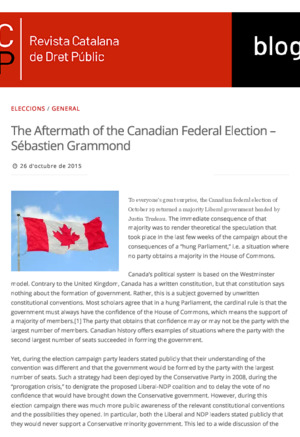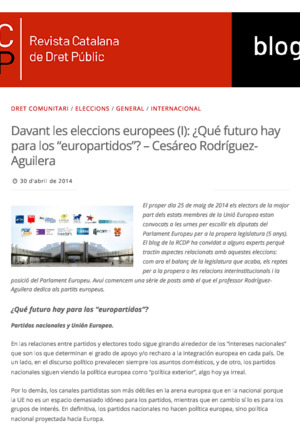The aftermath of the canadian federal election
Document Type
Others
Resum
To everyone’s great surprise, the Canadian federal election of October 19 returned a majority Liberal government headed by Justin Trudeau. The immediate consequence of that majority was to render theoretical the speculation that took place in the last few weeks of the campaign about the consequences of a “hung Parliament,” i.e. a situation where no party obtains a majority in the House of Commons. Canada’s political system is based on the Westminster model. Contrary to the United Kingdom, Canada has a written constitution, but that constitution says nothing about the formation of government. Rather, this is a subject governed by unwritten constitutional conventions. Most scholars agree that in a hung Parliament, the cardinal rule is that the government must always have the confidence of the House of Commons, which means the support of a majority of members.[1] The party that obtains that confidence may or may not be the party with the largest number of members. Canadian history offers examples of situations where the party with the second largest number of seats succeeded in forming the government.ISSN
2696-8916
Recommended citation
Grammond, Sébastien. (26 d'octubre de 2015). The aftermath of the canadian federal election. RCDP Blog. https://hdl.handle.net/20.500.14227/4802
Author
Language
English
Publisher
Escola d’Administració Pública de Catalunya
Publication date
2015-10-26Extension
4 p.
Is part of
RCDP blog
Subject (CDU)
00 - Prolegomena. Fundamentals of knowledge and culture. Propaedeutics
070 - Newspapers. The Press. Journalism
32 - Politics
342 - Public law. Constitutional law. Conflict of laws
Subject (LEMAC)
Keywords
Related items
Apunt de blog disponible a:
Link to the related item
Documents to download
This item appears in the following Collection(s)
- RCDP blog [714]
Rights
Except where otherwise noted, this item's license is described as http://creativecommons.org/licenses/by/4.0/
Related Items
Displaying related items by Title and Subject.
-
Davant les eleccions europees (I): ¿Qué futuro hay para los “europartidos”?
Rodríguez-Aguilera de Prat, Cesáreo (RCDP blog, 2014-04-30)El proper dia 25 de maig de 2014 els electors de la major part dels estats membres de la Unió Europea estan convocats a les urnes per escollir els diputats del Parlament Europeu per a la propera legislatura ... -
Davant les eleccions europees (II): Las primeras elecciones europeas bajo el Tratado de Lisboa
Pérez-Moneo, Miguel (RCDP blog, 2014-05-16)Los días 22 (Países Bajos y Reino Unido), 23 (Irlanda), 23 y 24 (República Checa), 24 (Eslovaquia, los departamentos y territorios franceses de ultramar, Letonia y Malta) y 25 de mayo (el resto de estados ... -
El movimiento soberanista en Quebec tras las elecciones federales canadienses de 2021: ¿renovarse o morir?
Romero Caro, Francisco Javier (RCDP blog, 2021-11-17)A finales de septiembre de 2021, Canadá celebró sus segundas elecciones en apenas dos años. A pesar de que la pandemia estaba lejos de estar controlada en algunas zonas del país y de que no parecían ...






